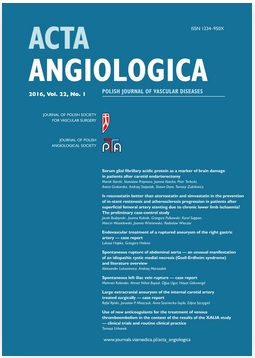Abdominal aortic aneurysm (AAA) and aortoiliac occlusive disease (AIOD) are common vascular diseases with both genetic and environmental risk factors involved. Matrix metalloproteinases (MMPs) play a major role in the remodelling of the extracellular matrix of aorta, and their contribution to the pathogenesis of abdominal aortic aneurysm is unquestionable. The purpose of this study was to examine the role of MMP13 (–77A>G) gene polymorphism in the development of abdominal aortic aneurysm (AAA) or aortoiliac occlusive disease (AIOD) in the Polish population. We investigated 925 individuals in 3 groups: AAA (n = 300), AIOD (n = 312), and control (n = 313). The MMP13 (–77A>G) genotyping analysis was performed by PCR–RFLP methods and gel electrophoresis. The MMP13 (–77A>G) genotype distribution and allele frequencies were consistent with the Hardy-Weinberg equilibrium. No significant differences in genotype distribution and allele frequencies between patients with the AAA or AIOD and the control group were observed. There were also no significant differences in MMP13 (–77A>G) genotype distribution and allele frequencies between the study groups in regard to gender, hypertension, myocardial infarction, or other risk factors. The results of our study indicate that MMP13 (–77A>G) gene polymorphism is a susceptibility factor neither of abdominal aortic aneurysm nor aortoiliac occlusive disease in the Polish population.

